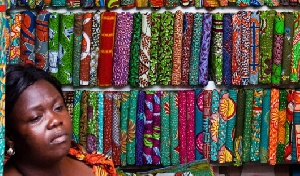From a massive workforce of 25,000 in the 1970s, the textile industry now employs a paltry 1,700 workers, Business Finder can confirm.
They are made up of 300 employees from Printex, 600 from Tex Style Ghana Limited formerly GTP and 800 from the Akosombo Textile Limited, Juapong Textile Limited and others have all collapsed.
General Secretary of the Ghana Federation of Labor, Abraham Koomson told this paper that but for the timely intervention of the anti-piracy task force the industry would have collapsed by now.
The taskforce was set up by government to check and destroy counterfeit products as well as arrest the perpetrators.
However, he explained that the health of the industry is not too good.
“It is not too good even though we appreciate the efforts government has been doing. The situation is like a sick person who has gone into coma. We are hoping to revive the industry though the situation is 50/50.”
According to him, though the industry is left with few workers, it was still experiencing job losses.
“ATL wants to offload but its problem is to raise funds and pay the workers. The workers under the condition of service must be paid 3 months of basic pay multiplied by the number of years served,” Mr Koomson explained.
According to him, ATL which he described as a distressed company has workers who are currently home but are being paid every month.
He noted that ATL cannot match up the inferior textile products from China and other Asian countries.
“ATL is a fully integrated textile firm that does spinning and weaving. The spinning and weaving department employs about 65 percent of the workers but the cost is too high. GTP and Printex are still surviving because they have closed down their spinning and weaving department and importing labour”
Explaining further, Mr Koomson said the textile firms are making huge losses and this year could be worse.
Concerning the future, Mr Koomson said there is some hope for the textile industry as the taskforce has been doing its best to revive the industry to some extent.
This year, the taskforce has confiscated more than 5,000 pieces of pirated textiles from traders in various markets across the country.
Click to view details



Business News of Friday, 21 August 2015
Source: The Finder
23,300 textile workers laid off in Ghana
Entertainment
















